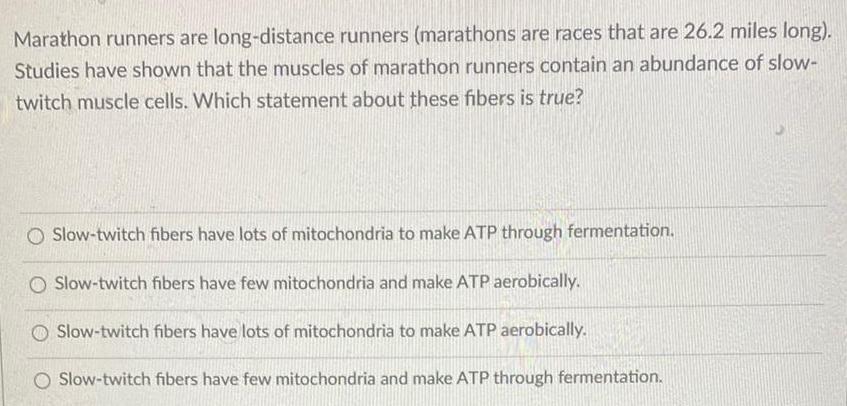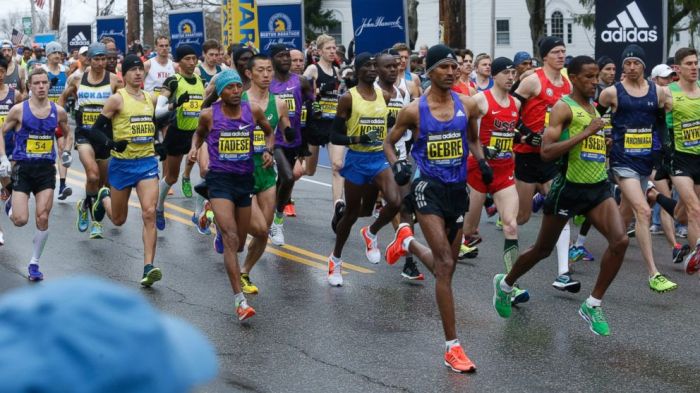Embark on an enlightening journey with our biology unit 1 marathon runner answer key, where we unravel the physiological adaptations, nutritional strategies, and training principles that empower marathon runners to conquer the grueling distance. Delve into the intricacies of human physiology and discover how the body transforms to meet the demands of long-distance running.
Our comprehensive guide provides a roadmap for marathon preparation, from understanding the physiological adaptations that enhance performance to crafting a tailored nutritional plan that fuels your body for success. Explore the key principles of marathon training, including periodization, intensity, and volume, and gain insights into the role of rest and recovery in optimizing your training.
1. Marathon Runner Adaptations
Marathon runners develop remarkable physiological adaptations that allow them to endure the extreme demands of long-distance running.
Cardiovascular Adaptations
- Increased stroke volume and cardiac output, enabling the heart to pump more blood with each beat.
- Enhanced capillary density in muscles, improving oxygen and nutrient delivery.
- Lower resting heart rate, reducing energy expenditure at rest.
Musculoskeletal Adaptations
- Increased muscle fiber density, especially in slow-twitch fibers, improving endurance capacity.
- Stronger tendons and ligaments, reducing the risk of injuries.
- Improved running economy, allowing runners to cover the same distance with less energy expenditure.
Metabolic Adaptations
- Increased glycogen storage in muscles, providing fuel for prolonged exercise.
- Enhanced fat oxidation, allowing runners to utilize fat as an alternative energy source.
- Improved lactate clearance, reducing muscle fatigue.
2. Nutrition for Marathon Runners
Proper nutrition is crucial for marathon runners to optimize performance and recovery.
Macronutrient Balance
- High carbohydrates (60-70% of total calories) for energy.
- Moderate protein (15-20% of total calories) for muscle repair.
- Low fat (15-20% of total calories), primarily from healthy sources.
Hydration
- Adequate fluid intake before, during, and after runs to prevent dehydration.
- Electrolyte replacement through sports drinks or tablets to replenish minerals lost through sweat.
Meal Timing
- Pre-race: High-carbohydrate meal 3-4 hours before the race.
- During-race: Energy gels, sports drinks, or small snacks to maintain energy levels.
- Post-race: Recovery meal high in carbohydrates and protein to replenish glycogen stores and promote muscle recovery.
3. Training Principles for Marathon Runners

Effective marathon training requires adherence to key principles.
Periodization
Dividing training into phases with specific goals, gradually increasing intensity and volume.
Intensity, Biology unit 1 marathon runner answer key
Incorporating varying intensities into training, including easy runs, tempo runs, and interval training.
Volume
Gradually increasing training distance and duration to build endurance.
Rest and Recovery
Adequate rest and recovery time to allow for muscle repair and prevent overtraining.
Sample Training Schedule
- Beginner: Start with 3-4 runs per week, gradually increasing distance and intensity.
- Intermediate: Train 4-5 days per week, including longer runs and interval training.
- Advanced: Train 6-7 days per week, with high volume and intensity.
4. Race Day Strategy for Marathon Runners

A well-executed race day strategy is essential for success.
Pacing
Starting at a conservative pace and gradually increasing it as the race progresses.
Hydration
Staying adequately hydrated throughout the race by drinking water or sports drinks regularly.
Nutrition
Consuming energy gels or sports drinks at regular intervals to maintain energy levels.
Mental Challenges
- Breaking the race into smaller segments to make it more manageable.
- Visualizing success and focusing on positive thoughts.
- Seeking support from other runners or spectators.
5. Recovery and Rehabilitation for Marathon Runners

Proper recovery and rehabilitation are essential after a marathon.
Physical Recovery
- Rest and sleep: Allow the body to repair and rebuild.
- Nutrition: Replenish glycogen stores and provide nutrients for muscle recovery.
- Stretching and massage: Improve flexibility and reduce muscle soreness.
Mental Recovery
- Reflection and analysis: Assess performance and identify areas for improvement.
- Relaxation techniques: Engage in activities that promote relaxation and reduce stress.
- Social support: Share experiences and seek encouragement from others.
FAQ Guide: Biology Unit 1 Marathon Runner Answer Key
What are the key physiological adaptations that marathon runners develop?
Marathon runners develop adaptations in their cardiovascular, respiratory, and musculoskeletal systems. These adaptations include increased heart size, increased lung capacity, and strengthened muscles and tendons.
How does nutrition play a crucial role in marathon training?
Nutrition provides the fuel and building blocks necessary for marathon runners to train effectively and recover from workouts. A balanced diet that includes adequate carbohydrates, protein, and healthy fats is essential for optimal performance.
What are the key principles of marathon training?
The key principles of marathon training include periodization, intensity, and volume. Periodization involves varying the intensity and volume of training over time to optimize fitness gains. Intensity refers to the effort level during workouts, while volume refers to the total amount of training.